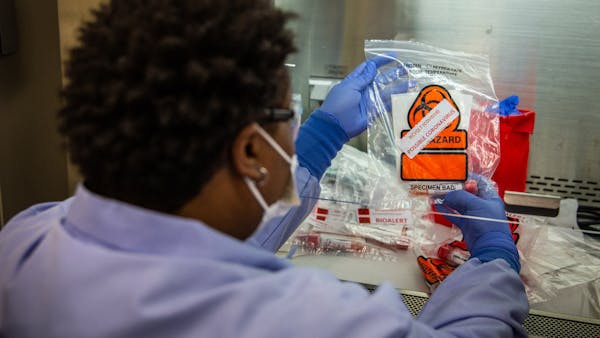Gov. Tim Walz proposed a scaled-back supplemental budget Thursday that leaves nearly $1.2 billion unspent, warning that state dollars should be used to expand public reserves, recover from emergencies and prepare for the coronavirus outbreak.
COVID-19, the illness caused by the new coronavirus, forced the Democratic governor to pare down his initial spending plans. Walz signed off on an additional $21 million Tuesday to respond to the virus, and he warned that millions more might be needed to combat the spread.
"There are going to be resources needed during this pandemic that it makes sense to me to leave those numbers on the bottom line so that we're in a position to be flexible and react," Walz said.
His proposal, an adjustment to the more than $48 billion two-year budget set last year, includes $257 million in supplemental spending through 2021. It would also use nearly $269 million more over the following two years. Some of the big-dollar items are natural disaster assistance, supporting student well-being, handling overpayments to tribes and additional staffing and overtime in state prisons.
In addition to the limited new spending, Walz wants to shift $491 million into the state's budget reserve. That would replenish the fund after lawmakers chose to tap into the reserve to reach a budget deal last year.
One notable absence from Walz's supplemental budget list was money for early childhood education, which has been a top DFL priority and an area Walz also wants to invest in. The governor said Thursday the situation has changed since he previously talked about spending goals, and he said it's possible that hospitals could come to the Legislature in the days ahead and ask for more than $100 million in state aid to handle the virus.
Early childhood programs are something the Legislature will take up in the next budget year, he said.
Walz's budget, however, does devote millions to farm accident prevention, transit safety, vaping prevention and improvements to how sexual assault exam kits are handled.
The spending plan is based on a prediction of surplus budget dollars. Last month state budget officials projected lower than anticipated spending and increased tax revenue would produce a $1.5 billion surplus, up from the previous $1.3 billion estimate. However, Minnesota Management and Budget Commissioner Myron Frans warned Thursday that the prediction could change as the economy slows.
Walz emphasized that the state should take advantage of low interest rates to pass a large public works borrowing measure, also known as the bonding bill. He previously rolled out his plan for a $2 billion borrowing package that included money to repair and improve water systems, university and college facilities and transportation infrastructure. Walz said that given the outbreak, he hopes legislators work quickly this year to pass a bonding bill and supplemental budget, "then get back home."
"I'm very aware that they need to do their business," Walz said. "But I think it just behooves all of us, that this is not a time to posture around issues that we're not going to reach consensus around."
Senate Republicans and House Democrats have highlighted differing priorities for the state's expected surplus, but they have yet to release detailed tax cut or spending plans. They could also adjust their proposals due to the coronavirus.
Republicans have suggested a plan where Minnesotans would "get your billion back," using the surplus to make a variety of tax cuts, including ending the state's Social Security income tax and reducing the lowest tax rate.
Responding to the governor's budget proposal, Senate Majority Leader Paul Gazelka, R-East Gull Lake, drew a connection between negotiations over the bonding bill and Republicans' desire for tax cuts.
"Our key priorities are exempting Social Security income. And if that's not something the governor wants to do, then why do we want to have a bigger bonding bill than what we normally do?" Gazelka said, noting that legislators could pass a "simple bill around $755 million" and leave.
However, he said Walz's plan to leave money on the bottom line was a prudent choice.
House Democrats also lauded Walz's caution.
"I think the governor's budget is very responsible in light of our present circumstances," said House Speaker Melissa Hortman, DFL-Brooklyn Park, adding that she would also like to bolster the state's reserves.
DFL leaders in the House have said they want to devote surplus dollars to young Minnesotans by expanding early education opportunities, child care and financial assistance for school lunches. While Walz's proposal spends little on early childhood education, it would allocate more than $84 million, largely in 2022 and 2023, to increasing Child Care Assistance Program rates to help people afford the care. It would also increase child care grants by $2 million.
Jessie Van Berkel • 651-925-5044
The Latest | Lawyers set to focus on picking alternates as Trump's hush money trial resumes
Finding an apartment may be easier for California pet owners under new legislation
AP Decision Notes: What to expect in Pennsylvania's presidential and state primaries

